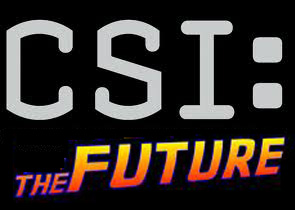Forensic Futurism
 If there's a common trope about "futurism," it's that it gets everything wrong.
If there's a common trope about "futurism," it's that it gets everything wrong.
From jetpacks to vacations on the Moon, any discussion of futurism in broader culture very quickly turns into a listing of the various crazy things that "futurists" (whether or not they'd call themselves that) have said over the past century. Sometimes it's an easy one-off article, sometimes it's an entire book
or blog devoted the topic. Done well, it's a kind of indulgent ridicule: those futurists sure are whacky, but charmingly whacky.
Anyone who has read my stuff will know that I'm not really fond of being called a "futurist," although it's the most widely-recognized name for what I do. I don't make predictions, and I don't talk in certainties; I'm all about trying to illuminate surprising implications of present-day processes. I don't expect that the scenarios I offer will be right, but I do want them to be usefully provocative.
But that doesn't mean that I'm irritated by the focus on futurists being wrong (although I will admit to being tired of the "jetpack" trope; can't we come up with another stereotyped prediction?). I wrote a piece awhile back about "legacy futures," and pay close attention to the responsibility foresight professionals have to acknowledging when they get things wrong.
So when the term "forensic futurism" showed up today (see the extended entry for how & why), it hit me as something both useful and meaningful.
It's not enough simply to point and ridicule about whacky futurists. Those of us in the discipline really need to examine why serious forecasts can turn out to be terribly wrong. This takes two related forms:
"Forensics" is a process involved in criminology, and I don't want to imply that futurists who get things wrong are doing something of dubious morality or legality. Instead, I'm riffing on the more popularized concept of the process, that of a strictly-evidence-based examination of a mysterious result. Leaping to conclusions, going only by hunches, and other subjective approaches are to be frowned upon; what we want to do is take a serious look at how we think about the future, in order to do so more usefully in the time to come.
It's a bit frustrating sometimes.
I'll be doing something innocuous -- reading a magazine, playing a game, something with a relatively low (but not zero) cognitive threshold, so that my brain is working but not focused -- and a phrase will pop into my head. It'll be novel (to me), typically a combination of terms that don't usually go together, yet seemingly something meaningful. I'll hop onto whatever digital device I have handy to see if someone else is already talking about the topic, to see if it's already a real thing. Often it is, and I can return to whatever I was doing. But sometimes, it's not -- it's a combination of terms that hasn't before been seen by the mighty eye of Google.
"Forensic Futurism" was today's term. And aside from a few pages including the two terms in an alphabetical listing, it's a term without a pre-existing presence. So the rest of my afternoon was spent trying to figure out what the hell forensic futurism might be, and why it sounded like it should mean something useful and/or important.






Comments
>>(although I will admit to being tired of the "jetpack" trope; can't we come up with another stereotyped prediction?)
I've been asking "Where's my affluent 20 hour work week?"
Posted by: Patrick Di Justo | February 16, 2012 7:08 PM
This is critically important for the energy utility industry. I have been urging for some time that the resource planning processes most utilities do should have a learning component so that prior plans don't just gather dust but form the foundation of reflection on what was different than expected and why. Now, I will add to this urging your third point of why some things were included in the forecast in the first place!
Thank you for this post (and many of your others that I have read so far).
Posted by: Pamela Morgan | February 17, 2012 12:37 PM
Curious if you think speculation like this infographic at National Geographic is useful to the future or not.
http://newswatch.nationalgeographic.com/2012/02/06/future-hospital-technology/
Does creating visions of the future help us move there?
Posted by: Micah | February 22, 2012 3:08 PM
Micah, I believe that they do, no matter if those visions are graphic or narrative. Visions (scenarios) help us make the connections, dig up the surprises, that are often difficult to imagine with a straightforward description of a narrow future change.
For example, the future hospital image may trigger in some viewers a realization that certain practices commonplace in the hospital where they work would no longer be possible in this future space, or that a little-known emerging technology might facilitate one of the changes depicted in the graphic.
Visualizations and scenarios allow the viewer/reader to imagine herself/himself as existing within that world, and serve then as a catalyst for new ideas.
Posted by: Jamais Cascio |
February 22, 2012 3:14 PM
|
February 22, 2012 3:14 PM
I don't know much about futurism as a practice, but if it is linear extrapolation, it's likely to be wrong. But if futurism is iterative, exercising foresight to think about how current trends evolve, then the foresight will feed back upon the present, shifting what we do. In that scenario, I don't think futurism could be "right" or "wrong." Just one guys 2¢.
Posted by: David Foley | February 24, 2012 8:30 AM